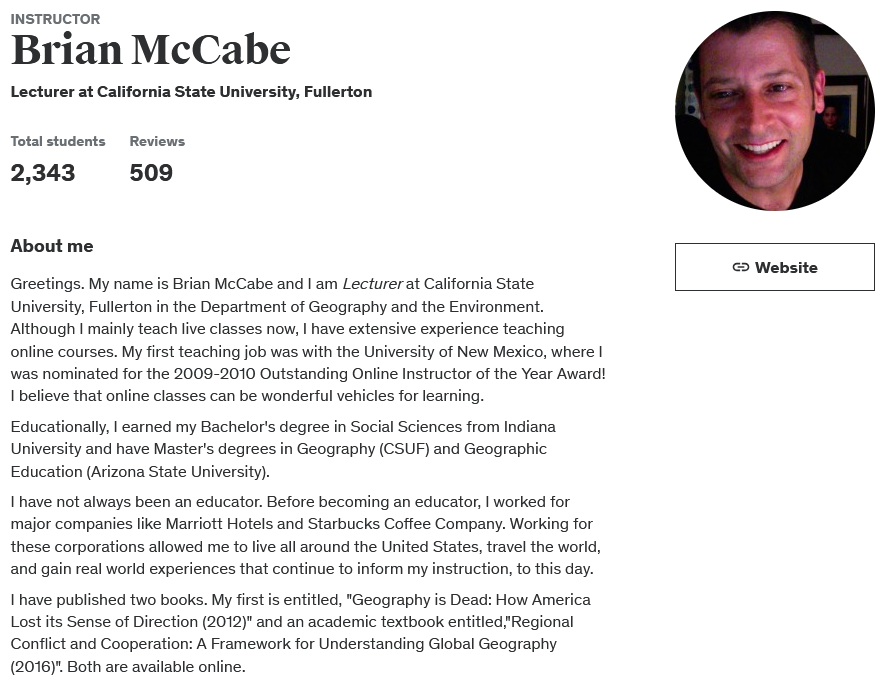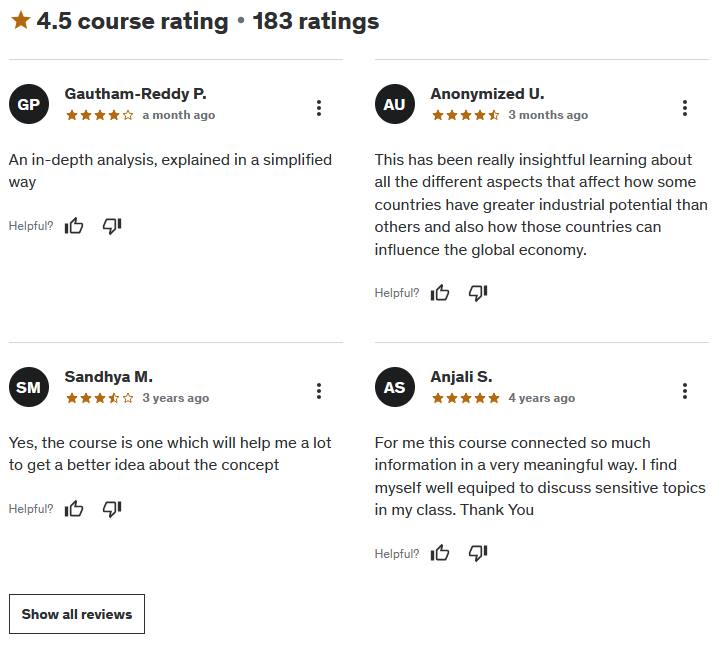Globalization – it’s a huge topic that’s reshaping the world, from how economies interact to the effects on culture and the environment. If you’ve ever wondered how we got here and where we’re heading, The Geography of Globalization on Udemy promises to dive deep into these questions. This course takes on the massive topic with a structured approach, offering insights into everything from historical theories to the impact of globalized trade on local cultures.
Instructor Reputation
Brian McCabe brings a solid blend of academic knowledge and practical experience to the table, making him a unique guide through the complexities of globalization. As a lecturer at California State University, Fullerton, McCabe is well-versed in the academic side of geography and globalization, but his teaching style stands out due to his extensive real-world experience. Unlike some instructors who focus solely on theory, McCabe has a background working for large corporations like Marriott and Starbucks. His career took him across the United States, exposing him to diverse economic environments and social dynamics, which helps him provide practical insights into globalization’s effects.

McCabe’s teaching journey includes a range of online and in-person roles. Notably, he was nominated for the Outstanding Online Instructor of the Year Award at the University of New Mexico in 2009-2010, showing his commitment to online education. This experience translates into a well-organized and clear teaching approach, essential for students navigating a broad topic like globalization. McCabe doesn’t rely solely on academic jargon; instead, he uses relatable examples and real-world applications that bring theory to life. His expertise is complemented by a collection of published works, including Geography is Dead: How America Lost its Sense of Direction and Regional Conflict and Cooperation: A Framework for Understanding Global Geography, both of which offer insights into his perspective on how geography and globalization intersect.
With an instructor rating of 4.4 from over 500 reviews, McCabe has earned a reputation for delivering content that’s both accessible and informative. His teaching style is approachable, and he brings in-depth knowledge without overwhelming his students. His students often describe him as thorough, patient, and skilled at connecting complex ideas to current global dynamics. These qualities make McCabe an ideal guide for a course on globalization, as he blends theoretical rigor with lived experiences that resonate with a wide audience.
Course Structure
The course design in The Geography of Globalization makes it easy for students to engage with a multifaceted subject. Divided into 15 lectures, the course is laid out in a logical progression, guiding students from the basic concepts to more complex ideas about the effects of globalization on economics, politics, culture, and the environment. Each module serves a specific purpose and gradually builds on the last, making the course ideal for beginners who may feel overwhelmed by the scale of the topic.

One highlight of the structure is the use of PowerPoint slides, which McCabe has created to help frame and reinforce key concepts. These slides aren’t just visual aids but organized learning tools that present information in an easy-to-follow manner. The visuals, combined with McCabe’s explanations, break down complicated theories like Least Cost Theory and demographic trends, making them approachable for students from various backgrounds. The pacing of the course is also well thought out. McCabe takes time to explain foundational ideas before diving into specific examples of how globalization affects different regions and industries.
Another strong aspect of the course structure is its blend of historical perspective with modern-day relevance. The early lectures cover the history and key ideologies that laid the foundation for globalization, allowing students to grasp the “how and why” behind today’s interconnected world. The later lectures shift focus to the effects on environmental and cultural aspects, presenting a holistic view of globalization’s impact. McCabe’s course also tackles some critical issues like uneven development and the environmental consequences of global trade. Each topic is explored from different angles, giving students a well-rounded understanding of the benefits and challenges associated with globalization.
The course is designed to be accessible with no prerequisites, and there’s no textbook required. This flexibility is appealing, as it allows students to jump into the course without any additional costs or prep work. The layout is suitable for a self-paced learning experience, so students can take their time with each lecture or revisit specific sections to deepen their understanding. Overall, the course structure provides a balanced, clear, and comprehensive look at globalization, making it ideal for those who want an insightful yet manageable dive into this important topic.
Content Quality
The Geography of Globalization course goes beyond the basics, offering a nuanced perspective on a vast subject. McCabe approaches globalization with depth, covering not only its foundational theories but also exploring the tangible effects on both local and global scales. Each lecture brings well-researched content that spans from historical origins to modern impacts, giving students a comprehensive understanding of how interconnected economies, societies, and cultures have evolved over time. McCabe’s expertise shines as he explains concepts like Least Cost Theory, demographic shifts, and the environmental effects of global trade. These complex ideas are broken down into manageable parts, which makes the course accessible even for those new to the topic.

One of the strengths of the content is how it ties theory to real-world applications. McCabe doesn’t stop at explaining the basics; he digs into how globalization affects actual lives, cultures, and economies. For instance, when discussing uneven global development, he illustrates how certain countries have been shaped by trade dynamics, showing students why some regions experience economic booms while others struggle. This practical approach keeps the content relevant and helps students apply what they learn to their own understanding of global issues. The course also delves into globally traded commodities and how they influence political and economic relationships, offering insights into the push-and-pull forces that define international relations.
McCabe’s content is enriched with engaging PowerPoint visuals that support his explanations, and while the slides are somewhat simple, they are effective in reinforcing key points. The visuals guide students through complex concepts and provide a helpful reference for visual learners. Though some information in the course could use updating to reflect the latest trends and statistics, the foundational knowledge is solid and highly informative. By covering a broad range of topics—from environmental impacts to cultural consequences—McCabe offers students a well-rounded education on globalization.
While a few reviews have noted that parts of the content may feel slightly outdated, the course largely holds up as a foundational introduction to globalization. The course presents a balanced view, showing both the positives and negatives of globalization without taking an overly optimistic or pessimistic stance. For students who are eager to learn how globalization continues to shape the world, this course offers quality content that feels meaningful and relevant.
Overall Course Rating – 8/10
With a thoughtful structure, engaging content, and a knowledgeable instructor, The Geography of Globalization deserves a solid 8 out of 10. This course is particularly strong for those who are just beginning to explore the topic, as it provides a comprehensive overview without getting bogged down in overly academic language. The score reflects the balance of content depth, accessibility, and the real-world relevance of the material. While some elements could benefit from updates, the course still holds substantial value as an introduction to globalization.

What sets this course apart is its ability to cover a wide range of topics without overwhelming the learner. By carefully constructing the lectures, McCabe has created a course that allows students to navigate through globalization’s complexity with confidence. This clarity in presentation is essential for such a big subject, and it’s clear that McCabe has put considerable effort into organizing each lecture to flow logically from one concept to the next. For those who are new to the subject, this logical flow makes the course easy to follow and helps students build knowledge gradually, one concept at a time.
The course’s strengths lie in McCabe’s experience and the well-rounded scope of topics covered. However, there is some room for improvement. A few areas in the content could be modernized to include recent statistics or references to current events in global trade and politics, which would make the material feel even more up-to-date. Additionally, while the PowerPoint slides serve their purpose well, they could benefit from a bit more creativity or interactive elements to keep students engaged in the longer lectures.
Overall, though, The Geography of Globalization is a strong course that provides both historical context and modern insights into one of today’s most relevant subjects. McCabe has successfully crafted a learning experience that is both accessible and informative, striking a great balance between academic theory and practical applications. This course is ideal for anyone with a curiosity about the forces shaping our interconnected world, making it a valuable addition to any learner’s repertoire.



